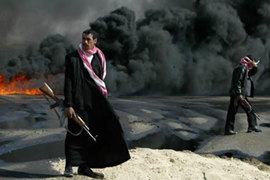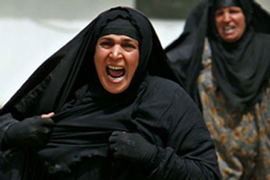
Return to Iraq
Witness presenter Rageh Omaar goes back to the country after five years of war.
Watch part two Watch part three Watch part four
Witness presenter Rageh Omaar returned to Iraq five years after reporting on the US-led invasion. He found much had changed and, as ordinary Iraqis told him, rarely for the better.
The extraordinary account of his journey can be seen on Al Jazeera.
 |
| Rageh Omaar returns to Iraq after five years after reporting on the US-led invasion |
“In 2003 I was a fresh-faced young correspondent, full of ambition and fear. For me this return was as much a personal quest as it was a professional assignment.
My six years of reporting in Iraq from 1997 onwards left me with a lasting affection for Iraqis and their country.
I returned because I wanted to know what happened to the colleagues I worked with – the ordinary Iraqis I met back then.
My first stop was the Palestine hotel, where I filed my first reports as US soldiers approached Baghdad advancing alongside the Tigris river and where my friend Taras Prostuk was killed.
Today, that hotel, home to many reporters before the war, is deserted and much of the capital is unrecognisable from the friendly place I could once freely wander around.
Baghdad’s Green Zone was once Saddam’s seat of power. Now it is the base for the new Iraqi government.
Covering nearly six square miles, ringed by concrete walls and checkpoints, it is protected by thousands of private security guards.
The new security measures mean it is now almost impossible to leave the area unaccompanied.
It is frustrating that I could not meet some of my Iraqi friends. They could not come and see me from the neighbouring Red Zone because they did not have special passes.
Today Baghdad is far more dangerous. There are only a few places we can film outside the car and even those areas feel strangely empty because so many residents have fled.
‘Vivid pictures’
 |
| Rageh found much had changed and, as ordinary Iraqis told him, rarely for the better |
Walls and razor wire are everywhere. They are not only here to keep insurgents and coalition troops apart but also to separate Sunnis from Shias.
In Saddam’s day, religious and tribal differences were suppressed under his dictatorship.
In post-war Iraq, sectarian loyalties and divisions have fuelled violence between warring groups vying for power.
And for many Iraqis the last five years have seemed like a lifetime.
Their individual stories paint a vivid picture of what the US-led invasion, occupation and sectarian violence has done to their country.
One such example is that of Kadhim Al-Jubouri. He had been a weightlifter, representing Iraq at a national level but fell out with Saddam Hussein’s sons over a business deal. He was sentenced to nine years in Abu Ghraib prison as a result.
Revenge came on April 9, 2003 when he famously began assaulting the towering statue of Saddam Hussein in Firdos Square with a hammer.
Hundreds joined him in his demolition job on the statue before it toppled, symbolising the Iraqis’ rage against decades of dictatorship and their relief that it was over.
Mixed feelings
However, Kadhim says that his relief has now turned to regret.
 |
| Five years have seemed like a lifetime for many Iraqis |
“When we had elections and the government started taking shape, the militias started killing everyone,” he says. “Things got worse and I began to change my mind.
“It was far worse than the two previous years of occupation. While I believe Saddam was a tyrant, a killer, a criminal, he did give us security, and there were opportunities for business and work. Now I don’t know whether to feel happy or sad.”
Kadhim is not the only one to feel let down by how things have turned out.
From the Iraqi journalists and minders I worked with, to my friends who are now living as refugees in Jordan and Syria, to the widow and family of Tareq Ayoub, the Al Jazeera journalist killed by US forces in Baghdad, all express disappointment at the last five years and see the US military as occupiers rather than liberators.
Some, however, still believe the invasion was for the best.
Mowiffek Al Rubaie was a neurologist but after returning from exile to take up public office he is Iraq’s national security adviser.
He attended the execution of Saddam Hussein, an event that many Iraqis say was closer to a killing by a sectarian lynch mob than a calm and measured enforcement of a death sentence passed by an Iraqi court of law.
Although al-Rubaie says mistakes were made on that day he maintains it was the right decision and that it was a historic development that brought a new chapter to the country.
But his optimism is very much the exception rather than the rule in modern day Iraq.
I also met Mohammed Said al Sahaff during my trip, the former information minister dubbed “Comical Ali” by the Western media. Everything he said was laughed at by westerners at the start of the war.
But now he is having the last laugh as everything he said has turned out to be true – and everything Blair and Bush said on Iraq has turned out to be laughable.“